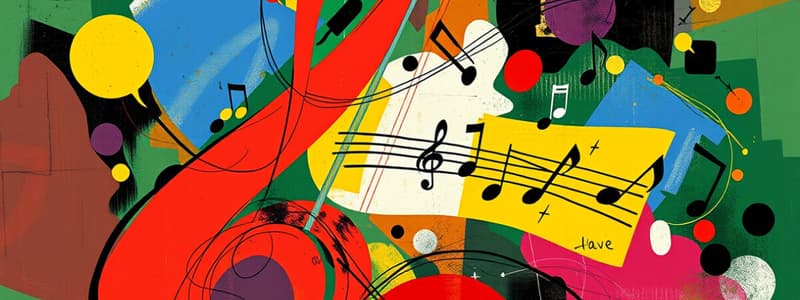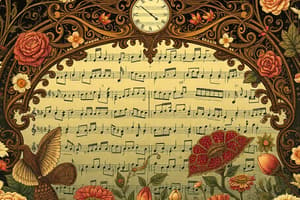Podcast
Questions and Answers
What does the term 'largo' mean?
What does the term 'largo' mean?
- Very slow (correct)
- Medium slow
- Fast
- Slow
What does the term 'adagio' mean?
What does the term 'adagio' mean?
- Slow (correct)
- Medium slow
- Very slow
- Very fast
What does 'andante' refer to in music?
What does 'andante' refer to in music?
- Moderate
- Medium slow, walking pace (correct)
- Slow
- Very slow
What does the term 'moderato' indicate?
What does the term 'moderato' indicate?
What is the meaning of 'allegro'?
What is the meaning of 'allegro'?
What does 'presto' mean?
What does 'presto' mean?
What does the term 'pianissimo' mean?
What does the term 'pianissimo' mean?
What does 'piano' signify in music?
What does 'piano' signify in music?
What is the meaning of 'mezzo piano'?
What is the meaning of 'mezzo piano'?
What does 'mezzo forte' mean?
What does 'mezzo forte' mean?
What does the term 'forte' signify?
What does the term 'forte' signify?
What does 'fortissimo' mean?
What does 'fortissimo' mean?
What does 'crescendo' indicate?
What does 'crescendo' indicate?
What does 'decrescendo' refer to?
What does 'decrescendo' refer to?
What does 'accelerando' mean?
What does 'accelerando' mean?
What does 'ritardando' signify?
What does 'ritardando' signify?
What does 'ritenuto' refer to?
What does 'ritenuto' refer to?
What does 'con moto' mean?
What does 'con moto' mean?
What is the meaning of 'meno mosso'?
What is the meaning of 'meno mosso'?
What does 'doppio movimento' refer to?
What does 'doppio movimento' refer to?
What does 'a tempo' mean?
What does 'a tempo' mean?
What does 'l'istesso tempo' signify?
What does 'l'istesso tempo' signify?
What does 'rubato' refer to?
What does 'rubato' refer to?
What does 'fermata' mean?
What does 'fermata' mean?
What does 'caesura' indicate?
What does 'caesura' indicate?
What does 'legato' mean?
What does 'legato' mean?
What is the meaning of 'tenuto'?
What is the meaning of 'tenuto'?
What does 'portato' mean?
What does 'portato' mean?
What does 'staccato' refer to?
What does 'staccato' refer to?
What does 'staccatissimo' mean?
What does 'staccatissimo' mean?
What does 'marcato' mean?
What does 'marcato' mean?
What does 'sforzando' signify?
What does 'sforzando' signify?
What does 'cantabile' mean?
What does 'cantabile' mean?
What does 'dolce' refer to?
What does 'dolce' refer to?
What does 'espressivo' mean?
What does 'espressivo' mean?
What does 'scherzando' indicate?
What does 'scherzando' indicate?
What does 'leggiero' mean?
What does 'leggiero' mean?
What does 'sostenuto' signify?
What does 'sostenuto' signify?
What does 'maestoso' mean?
What does 'maestoso' mean?
What does 'pesante' refer to?
What does 'pesante' refer to?
What does 'simile' mean?
What does 'simile' mean?
What is the meaning of 'poco a poco'?
What is the meaning of 'poco a poco'?
What does 'subito' mean?
What does 'subito' mean?
What does 'molto' refer to?
What does 'molto' refer to?
What does 'non' mean?
What does 'non' mean?
What does 'sempre' signify?
What does 'sempre' signify?
What does 'senza' mean?
What does 'senza' mean?
What does 'divisi' refer to?
What does 'divisi' refer to?
What does 'tutti' mean?
What does 'tutti' mean?
What does 'tacet' mean?
What does 'tacet' mean?
Flashcards are hidden until you start studying
Study Notes
Italian Musical Terms Study Notes
- Largo: Indicates a very slow tempo, often used to create a calm atmosphere.
- Adagio: Represents a slow tempo, allowing for expressive playing.
- Andante: Denotes a medium slow tempo, akin to a walking pace, creating a relaxed feel.
- Moderato: Signifies a moderate tempo, serving as a balanced pace in compositions.
- Allegro: Indicates a fast tempo, lively and bright, often raising energy.
- Presto: Represents a very fast tempo, quickens the piece, creating excitement.
- Pianissimo: Indicates a very soft dynamic level, conveying tenderness and subtlety.
- Piano: Signifies a soft dynamic, allowing for gentle expression in music.
- Mezzo Piano: Denotes a medium soft dynamic, balancing softness with presence.
- Mezzo Forte: Represents a medium loud dynamic, providing a stronger yet balanced sound.
- Forte: Indicates a loud dynamic, striking attention and intensity in performance.
- Fortissimo: Signifies a very loud dynamic, often used for dramatic emphasis.
- Crescendo: Describes a gradual increase in loudness, building intensity in a musical phrase.
- Decrescendo: Indicates a gradual decrease in loudness, softening the musical expression.
- Accelerando: Suggests a gradual increase in tempo, speeding up the music.
- Ritardando: Signifies a gradual decrease in tempo, slowing down for expressive effect.
- Ritenuto: Indicates a sudden slowdown in tempo, often for dramatic impact.
- Con Moto: Means "with motion," encouraging energetic playing.
- Meno Mosso: Indicates "less motion," suggesting a slower pace than before.
- Doppio Movimento: Means "twice as fast," calling for a double speed in tempo.
- A Tempo: Refers to returning to the original tempo after a deviation.
- L'istesso Tempo: Means to keep the same tempo, maintaining consistency throughout.
- Rubato: Describes a flexible treatment of tempo, allowing for expressive phrasing.
- Fermata: Instruction to sustain a note longer than its original value, creating a pause.
- Caesura: A short pause in the music, providing dramatic effect before continuation.
- Legato: Indicates notes should be played smoothly and connected without breaks.
- Tenuto: Suggests that a note should be played at full value, held for its complete duration.
- Portato: Means slightly separating notes within a slur, creating a gentle lift.
- Staccato: Indicates that notes should be played detached and separated.
- Staccatissimo: A very short staccato, emphasizing rapid detachment.
- Marcato: Denotes a marked, emphasized playing style, accentuating certain notes.
- Sforzando: Signifies a sudden strong accent on a note or chord.
- Cantabile: Indicates a singing style of playing, focusing on lyrical expression.
- Dolce: Suggests playing sweetly, conveying tenderness and warmth.
- Espressivo: Calls for expressive playing, emphasizing emotional content in the music.
- Scherzando: Indicates a playful manner, lighthearted in approach.
- Leggiero: Suggests a light and agile playing style.
- Sostenuto: Means to sustain notes over their full length, creating a lingering sound.
- Maestoso: Indicates a majestic style, exuding grandeur and dignity.
- Pesante: Suggests a heavy, weighted performance, often slow and serious.
- Simile: Indicates to continue in the same manner, maintaining the previous style.
- Poco a Poco: Means little by little, suggesting gradual progression in dynamics or tempo.
- Subito: Indicates sudden changes, often in dynamics or tempo.
- Molto: Signifies much or very, used to intensify instructions.
- Non: Means not, often used to negate a dynamic or instruction.
- Sempre: Indicates always, suggesting consistency throughout the piece.
- Senza: Means without, used in various contexts within music.
- Divisi: Indicates to divide the parts, often within an ensemble setting.
- Tutti: Means all, instructing everyone to play together.
- Tacet: Instructs to be silent or not play during a passage.
Studying That Suits You
Use AI to generate personalized quizzes and flashcards to suit your learning preferences.




